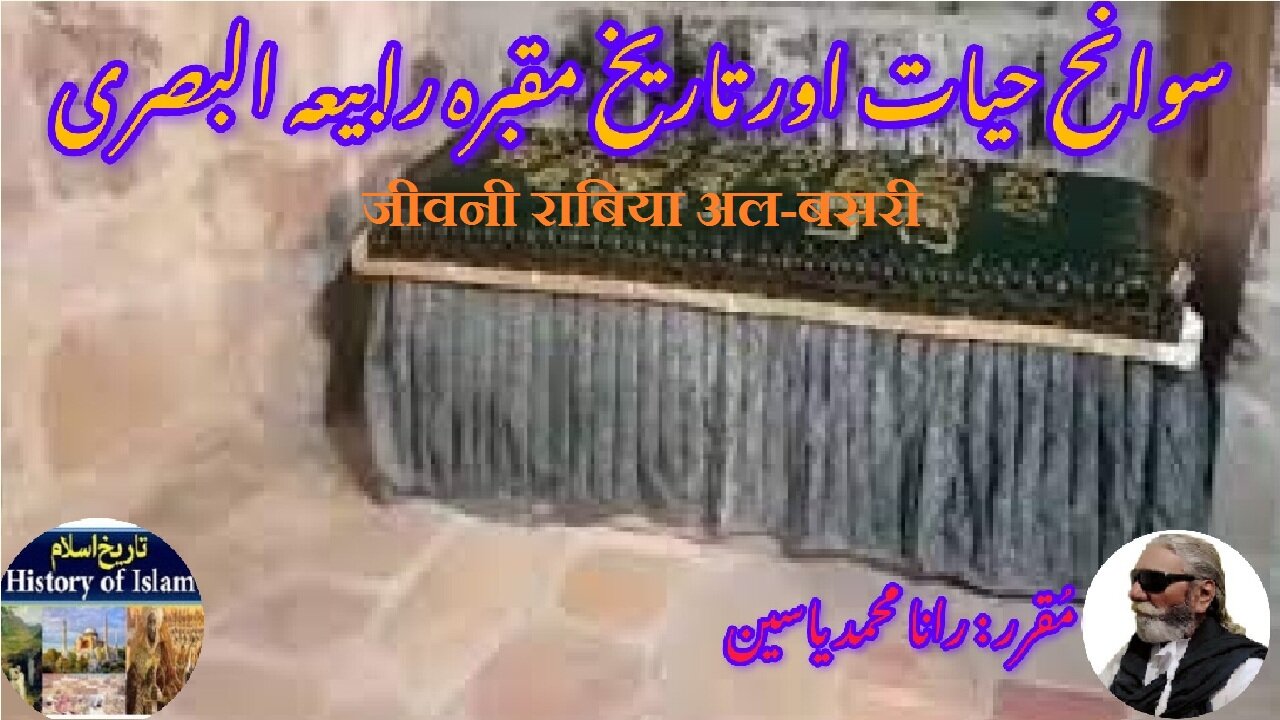Premium Only Content

Biography Raabiah al-Basri | जीवनी राबिया अल-बसरी | رابعہ البصری کی سوانح عمری اور مزار کی تاریخ
@islamichistory813 #biography #rabiah #albasri #sufisaint #cultural #heritage #biography #islamic #mysticism #islamic #philosophy #shrine #historical #figures
Biography of Rabi'ah al-Basri and the history of his shrine
Dekhti Aankhooon aur sountay kaanoon ko Asslamoalaikum, sisters, brothers friends and elders, in informative series videos of Islamic ascolars, sufisaints, cultural heritages, islamic philosophys, islamic mysticisms and historical figures. today we are describing biography of Rabi'ah al-Basri and the history of his shrine.
Rabi'ah al-Adawiyah al-Qaysiyyah, often known as Rabi'ah al-Basri, was born around 716 CE in the city of Basra, which was located in present-day Iraq. She is widely regarded as one of the most influential and revered figures in the early development of Sufism, and her contributions to Islamic mysticism have had a lasting impact on the spiritual landscape of the Muslim world. Rabi'ah is often celebrated for her deep devotion to God, her profound spirituality, and her poetic expressions of love for the Divine. Her life and work have become a source of inspiration for countless individuals seeking to cultivate a closer relationship with God and attain inner peace through mystical practices.
Rabi'ah was born into a humble family, and her early life was marked by hardship and struggle. According to historical accounts, her parents were poor, and after the death of her father, she was taken captive by slave traders. She was eventually sold into slavery, where she spent many years serving her master. Despite these difficult circumstances, Rabi'ah is said to have maintained an unwavering commitment to her faith. Throughout her life, she experienced a profound sense of separation from the material world and developed a deep longing for a closer connection to God. Her intense spiritual yearning and her commitment to living a life of purity and devotion would later define her as one of the foremost mystics in Islamic history.
Rabi'ah's turning point came when she was freed from slavery, and she chose to dedicate her life entirely to the worship of God. She withdrew from the world, living a life of asceticism and deep spiritual reflection. Her days were spent in prayer, fasting, and contemplation, and she became known for her deep love of God and her rejection of worldly desires. Rabi'ah's devotion to God was so profound that she is said to have prayed not only for her own salvation but also for the salvation of others. She viewed her relationship with God as one of pure love and devotion, and her expressions of this love became central to her teachings.
One of the defining characteristics of Rabi'ah's spiritual philosophy was her emphasis on *ishq* (divine love) as the highest form of devotion. Unlike many other early Sufis, Rabi'ah did not focus on the fear of Hell or the hope of Paradise as primary motivations for her religious practices. Instead, she believed that the true goal of worship was to cultivate a deep and selfless love for God, transcending any desire for personal reward or fear of punishment. This concept of *ishq* as the central driving force of spirituality has become one of the key themes in Sufi literature and thought, and Rabi'ah's teachings have inspired generations of mystics who followed her path.
Rabi'ah is also known for her profound poetic expressions, which convey the intensity and purity of her love for the Divine. Her poetry is often marked by themes of divine longing, spiritual yearning, and the pursuit of inner purification. Although much of her poetry has been lost to history, the verses that remain offer a glimpse into her deep connection with God. Her poems often express a sense of longing and separation from the Divine, as well as a desire to be united with the Beloved. Through her poetry, Rabi'ah communicated the depth of her mystical experiences, and her words resonated with those who sought to understand the inner dimensions of Islam and the path to spiritual enlightenment.
Rabi'ah's influence as a Sufi mystic extended far beyond her own lifetime. She is considered one of the earliest and most important figures in the development of Sufism, and her teachings laid the groundwork for many of the spiritual practices that would later become central to the Sufi tradition. Her emphasis on divine love, asceticism, and the rejection of worldly desires became foundational principles in Sufi thought. Rabi'ah's life and teachings were a source of inspiration for many later Sufi saints, including figures like Junayd of Baghdad and Al-Hallaj, who would continue to shape the development of Sufism in the centuries following her death.
Rabi'ah passed away in 801 CE, but her legacy has endured through the centuries. Her tomb, located in the city of Basra, Iraq, has become a significant pilgrimage site for those seeking to honor her memory and seek spiritual blessings. The shrine of Rabi'ah al-Basri is a place where visitors gather to pay homage to her as one of the greatest female Sufi saints and to reflect on her teachings of divine love and devotion. The site remains a testament to her influence and the enduring power of her spiritual message. It is a place where those seeking to deepen their understanding of the mystical path can connect with the spirit of Rabi'ah and be inspired by her commitment to love, selflessness, and the pursuit of closeness to God.
In addition to her tomb, Rabi'ah's teachings have been preserved through the writings of her disciples and later Sufi scholars. Her influence can be seen in the works of numerous Sufi poets and philosophers who have drawn on her ideas and incorporated them into their own spiritual practices. Rabi'ah's contributions to the development of Sufism are widely acknowledged, and her life serves as a powerful reminder of the transformative power of divine love and the importance of inner purity in the pursuit of spiritual enlightenment.
In conclusion, Rabi'ah al-Adawiyah al-Qaysiyyah, or Rabi'ah al-Basri, remains one of the most revered and influential figures in the history of Sufism. Her life and teachings have had a profound impact on the development of Islamic mysticism, and her emphasis on divine love and devotion continues to inspire those on the spiritual path. Her legacy as one of the earliest and most prominent female Sufi saints is preserved in the shrine at Basra, where her memory lives on as a symbol of the transformative power of love and the quest for closeness to the Divine. Through her poetry, her asceticism, and her unwavering commitment to God, Rabi'ah has left a lasting mark on the history of Sufism and remains a beacon of light for all those who seek to follow the path of divine love.
With this, we seek your permission until tomorrow, tomorrow we will describe the biography of Abdul Rahman Momand and the history of his Shrine.
===========================
-
 5:33
5:33
ISLAMIC HISTORY
10 hours agoScholar Aisha Abdul Rahman Bewli Ayishah abdalrahman biyoli اسلامی سکالرہ عائشہ عبدالرحمن بیولی
2 -
 LIVE
LIVE
Joker Effect
1 hour agoInterviewing GREENMAN! Looks like he is coming to Rumble! Let's give him a warm welcome! REAL TALENT
423 watching -
 LIVE
LIVE
Anthony Rogers
8 hours agoEpisode 380 - Is Pain All In Your Head?
49 watching -
 1:46:17
1:46:17
Glenn Greenwald
5 hours agoGlenn Takes Your Questions on Censorship, Epstein, and More; DNC Rejects Embargo of Weapons to Israel with Journalist Dave Weigel | SYSTEM UPDATE #505
96K6 -
 LIVE
LIVE
Jokeuhl Gaming and Chat
7 hours agoHelldivers 2 - Spreading Democracy w/ Ryker
47 watching -
 27:47
27:47
Stephen Gardner
2 hours ago🚨BREAKING: Trump FURIOUS Over Kamala’s Latest Move – SHOCKING Details!
7.41K28 -
 8:00:13
8:00:13
Dr Disrespect
10 hours ago🔴LIVE - DR DISRESPECT - GEARS RELOADED GLOBAL LAUNCH - CRUSHING LOCUST
106K13 -
 LIVE
LIVE
Reolock
3 hours agoWoW Classic Hardcore | One level at a time
22 watching -
 LIVE
LIVE
Spartan
5 hours agoScrims vs FaZe then Ranked + Expedition 33
10 watching -
 57:00
57:00
BEK TV
1 day agoOpen Range
5.73K1